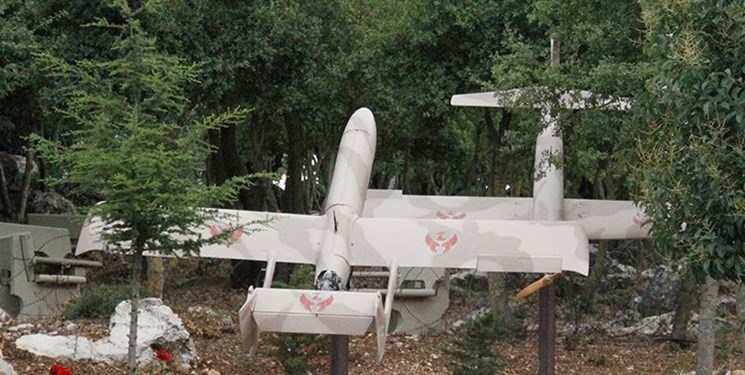The drone, named “Hassan”, returned to its base after flying for about 40 minutes at a depth of 70 km in occupied Palestine. However, all attempts by the Zionist regime’s defense systems and air force, such as the Iron Dome, F-16 fighters and the Apache helicopters failed to shoot down the drone.
The recent operation of Hezbollah reconnaissance drones in occupied Palestine has important strategic “messages” and “consequences” in political, military, economic, etc. dimensions, the most important of which are as follows:
One: This incident shows that Hezbollah, which is an important part of the body of Islamic Resistance in the region, has practically become one of the main owners of “smart, advanced and operational” drones in the world, which can be worrying for the Zionist regime.
Many countries in the region, despite their large military expenditures and tens of billions of dollars in annual purchases, still do not have the capacity to compete with Hezbollah in terms of advanced manufacturing technology, mass production, and the use of drones.
Existing estimates show that Hezbollah’s missile and drone capability with more than 2,000 drones and 150,000 missiles is more than 95% of the countries.
Two: The Iron Dome is a very expensive multi-layered missile defense system that the Zionist regime has spent hundreds of millions of dollars over the past decade to compensate for vulnerabilities and counter missile and drone threats. In recent years, some of the Persian Gulf Arab regimes have offered to pay for the Iron Dome by paying large sums of money, along with political, military, security and economic commitments to Tel Aviv.
Given that Hezbollah is well aware of the way to pass through this defense system, and recently managed to pass Hassan Drone through this system, this measure is a “gross defeat” for the Iron Dome of the Zionist regime, which will disappoint some Arab governments in the region that have been looking for years to ensure their security through the establishment of the said system in their country. As the head of the Yemeni Supreme Revolutionary Committee recently tweeted: The Zionist usurpers have suggested to the UAE that they use their [Zionist] missile systems to shoot down Yemeni drones and missiles. Now, after the Hezbollah drone reconnaissance operation in the depths of the occupied territories, we address the Zionists: If you are right, you are more deserving for using missile systems.
Three: From an economic point of view, the arrival of Hezbollah drones in occupied Palestine fundamentally calls into question the huge sums that the Zionist regime has spent in recent years on equipping, improving and upgrading its military, air force and defense systems infrastructures.
In addition to the Iron Dome, the Zionist regime flew its F-16 fighter jets and Apache helicopters to intercept Hezbollah drone, but failed to shoot it down. The flight of an F-16 fighter jet costs more than 22,000 dollars per hour, an Apache helicopter flight costs 5,000 dollars per hour, and each missile fired from the Iron Dome costs about 50,000 dollars for the Zionist army!
Fourth: Applying a new “balance of terror” in the occupied territories and against the Zionist regime is the next important consequence in this regard. Given that strengthening the “deterrence equation” and shifting the balance of terror and power in the occupied territories in favor of the Islamic Resistance is one of Hezbollah’s key goals in recent operations, therefore, it seems that such goals are being achieved.
Maintaining and strengthening the balance of terror is a policy that Hezbollah is relying on to undermine the security doctrines of the Zionist regime. The arrival of a drone in occupied Palestine, near Tel Aviv, was enough to completely question the security doctrines and the claims of the Zionist authorities against the Islamic Resistance.
Five: Strengthening the process of vulnerability of the Zionist regime and showing the inefficiency of its air force is the next important consequence in this regard. Even the Zionist regime’s security circles have announced that the regime is no longer capable of countering the drones and missiles of the Lebanese Islamic Resistance. What will a regime that cannot prevent a drone from entering the airspace of occupied Palestine do in the face of tens and perhaps hundreds of suicide and war drones that may enter the occupied territories from different places at an appropriate time?!
Six: The weakening of psychological security of public opinion and the inhabitants of the occupied territories is another important consequence that cannot be ignored. A survey on the media and public opinion inside the Zionist regime shows that despite the elapse of several days of Hezbollah drone operations, there is still great fear in the Zionist regime’s army and security institutions about the issue of drones and the inability of the Iron Dome to intercept them.
Increased fear and panic in the public opinion and the inhabitants of the occupied lands, especially the settlers, is a problem that can paralyze the project of expanding the settlement in the occupied lands. Living in areas and towns where the safety of its inhabitants is damaged and faced with disturbance, is psychologically very costly which may also lead to the spread of political protests.
The issue of Islamic Resistance’s drones becomes even more important when we know that the trend of battles of the Islamic Resistance with the Zionist regime are moving more intensely from “human-centered” towards “equipment-oriented”.










0 Comments